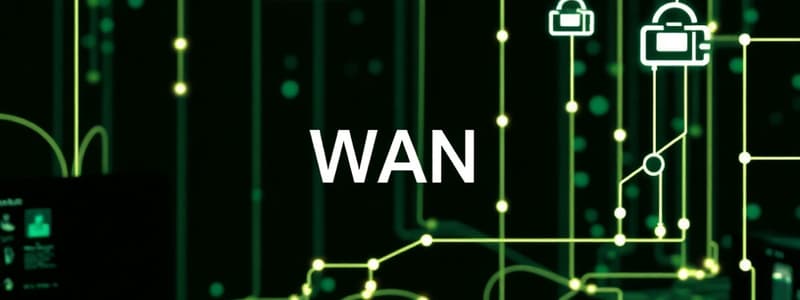Podcast
Questions and Answers
What is meant by the term 'host' in networking?
What is meant by the term 'host' in networking?
- A device that connects to the internet
- A type of network architecture
- A network printer or peripheral
- A server or client computer (correct)
How is a Local Area Network (LAN) defined?
How is a Local Area Network (LAN) defined?
- A network that connects multiple countries
- A network of devices connected within a single building or close proximity (correct)
- A type of server-client architecture
- Any network covering a large geographic area
What makes multiple floors of computers in one building a LAN?
What makes multiple floors of computers in one building a LAN?
- The ownership and management by the same IT group (correct)
- The physical distance between devices
- The number of connected devices
- The use of wireless technology
Which scenario represents a Campus LAN?
Which scenario represents a Campus LAN?
What distinguishes a Wide Area Network (WAN) from a LAN?
What distinguishes a Wide Area Network (WAN) from a LAN?
Which of the following best explains why a simple connection of two computers is a LAN?
Which of the following best explains why a simple connection of two computers is a LAN?
In what situation would a WAN be applicable?
In what situation would a WAN be applicable?
How do the terms 'hosts' and 'nodes' differ in networking?
How do the terms 'hosts' and 'nodes' differ in networking?
What is a significant drawback of the mesh topology?
What is a significant drawback of the mesh topology?
Which network topology is commonly used for Wide Area Networks (WANs)?
Which network topology is commonly used for Wide Area Networks (WANs)?
What defines a Local Area Network (LAN) compared to a Wide Area Network (WAN)?
What defines a Local Area Network (LAN) compared to a Wide Area Network (WAN)?
Which characteristic of mesh topology enhances its reliability?
Which characteristic of mesh topology enhances its reliability?
What is a typical challenge when implementing a mesh topology within a network?
What is a typical challenge when implementing a mesh topology within a network?
Why is the Internet often compared to a mesh topology?
Why is the Internet often compared to a mesh topology?
What factor determines if a network is classified as a WAN?
What factor determines if a network is classified as a WAN?
In which scenario would point-to-point links between devices in a mesh topology be considered impractical?
In which scenario would point-to-point links between devices in a mesh topology be considered impractical?
What benefit does the redundancy in a mesh topology offer?
What benefit does the redundancy in a mesh topology offer?
Which topology is generally easier to troubleshoot, compared to mesh topology?
Which topology is generally easier to troubleshoot, compared to mesh topology?
What accurately describes half duplex communication?
What accurately describes half duplex communication?
Which topology is identified as the most common in everyday use?
Which topology is identified as the most common in everyday use?
How does a hub handle incoming data packets?
How does a hub handle incoming data packets?
What is a primary limitation when utilizing a hub in a network?
What is a primary limitation when utilizing a hub in a network?
Why are switches considered to be more advanced than hubs?
Why are switches considered to be more advanced than hubs?
What happens to a star topology when the central switch fails?
What happens to a star topology when the central switch fails?
What does the term 'converged' refer to in switch functionality?
What does the term 'converged' refer to in switch functionality?
What distinguishes full duplex from half duplex communication?
What distinguishes full duplex from half duplex communication?
What potential security risk is associated with using a hub?
What potential security risk is associated with using a hub?
Why is a hub considered an outdated technology?
Why is a hub considered an outdated technology?
In star topology, what role does the central device play?
In star topology, what role does the central device play?
What is a characteristic of a logical bus topology?
What is a characteristic of a logical bus topology?
How do switches maintain efficiency in data transmission?
How do switches maintain efficiency in data transmission?
Which factor contributes to the ease of configuration in star topology?
Which factor contributes to the ease of configuration in star topology?
In a peer-to-peer network, what role can any computer take on?
In a peer-to-peer network, what role can any computer take on?
What is a significant disadvantage of a peer-to-peer network in terms of management?
What is a significant disadvantage of a peer-to-peer network in terms of management?
Why are bus and ring topologies considered outdated?
Why are bus and ring topologies considered outdated?
What distinguishes a centralized network from a decentralized one?
What distinguishes a centralized network from a decentralized one?
In what scenario would a computer be acting as a server?
In what scenario would a computer be acting as a server?
What is a common recommendation for the number of computers in a peer-to-peer network?
What is a common recommendation for the number of computers in a peer-to-peer network?
What type of network is typical for small offices or home offices?
What type of network is typical for small offices or home offices?
In a large enterprise network, what role does a server typically serve?
In a large enterprise network, what role does a server typically serve?
What feature characterizes a decentralized network?
What feature characterizes a decentralized network?
What aspect is crucial for security in centralized networks?
What aspect is crucial for security in centralized networks?
Which type of topology is commonly used in modern networks?
Which type of topology is commonly used in modern networks?
What is a key characteristic of a centralized network?
What is a key characteristic of a centralized network?
Why might an IT professional recommend limiting the number of devices in a peer-to-peer network?
Why might an IT professional recommend limiting the number of devices in a peer-to-peer network?
What role does the Internet Service Provider (ISP) play in a typical home network?
What role does the Internet Service Provider (ISP) play in a typical home network?
What is the primary purpose of WAN providers in connecting remote office buildings?
What is the primary purpose of WAN providers in connecting remote office buildings?
Which network is specifically characterized by the use of Bluetooth devices?
Which network is specifically characterized by the use of Bluetooth devices?
What distinguishes a Campus Area Network (CAN) from other types of networks?
What distinguishes a Campus Area Network (CAN) from other types of networks?
In the context of networks, what is a node?
In the context of networks, what is a node?
Which type of networks typically require leasing rather than ownership?
Which type of networks typically require leasing rather than ownership?
What type of server might provide file services in a client-server network?
What type of server might provide file services in a client-server network?
What is a significant characteristic of Intermediate nodes in a network?
What is a significant characteristic of Intermediate nodes in a network?
Which statement accurately describes a Classical Client-Server Network?
Which statement accurately describes a Classical Client-Server Network?
What best defines a Municipal Area Network (MAN)?
What best defines a Municipal Area Network (MAN)?
Where would you most likely encounter a Campus Area Network (CAN)?
Where would you most likely encounter a Campus Area Network (CAN)?
What is the main concern associated with using the Internet for inter-office connections?
What is the main concern associated with using the Internet for inter-office connections?
Which term refers to the connections made between devices in a network?
Which term refers to the connections made between devices in a network?
How are services typically provided in a client-server model?
How are services typically provided in a client-server model?
What is an essential distinction between endpoint nodes and intermediate nodes?
What is an essential distinction between endpoint nodes and intermediate nodes?
Flashcards
Host
Host
A computer or server connected to a network. It can be either a client or a server.
Node
Node
Any device that can connect to a network, including computers, printers, routers, and switches.
LAN (Local Area Network)
LAN (Local Area Network)
A network that connects computers and devices within a limited geographical area, usually a single building or campus.
Campus LAN
Campus LAN
Signup and view all the flashcards
WAN (Wide Area Network)
WAN (Wide Area Network)
Signup and view all the flashcards
Internetwork
Internetwork
Signup and view all the flashcards
Client-Server Network
Client-Server Network
Signup and view all the flashcards
Peer-to-Peer Network
Peer-to-Peer Network
Signup and view all the flashcards
WAN
WAN
Signup and view all the flashcards
LAN
LAN
Signup and view all the flashcards
MAN
MAN
Signup and view all the flashcards
CAN
CAN
Signup and view all the flashcards
PAN
PAN
Signup and view all the flashcards
Link
Link
Signup and view all the flashcards
Clients
Clients
Signup and view all the flashcards
Servers
Servers
Signup and view all the flashcards
Server operating system
Server operating system
Signup and view all the flashcards
Client operating system
Client operating system
Signup and view all the flashcards
Router
Router
Signup and view all the flashcards
Centralized Network
Centralized Network
Signup and view all the flashcards
Network Topology
Network Topology
Signup and view all the flashcards
Bus Topology
Bus Topology
Signup and view all the flashcards
Ring Topology
Ring Topology
Signup and view all the flashcards
Screened Network
Screened Network
Signup and view all the flashcards
Centralized Network
Centralized Network
Signup and view all the flashcards
Network Topology
Network Topology
Signup and view all the flashcards
Mesh Topology
Mesh Topology
Signup and view all the flashcards
Physical Star Topology
Physical Star Topology
Signup and view all the flashcards
Logical Star Topology
Logical Star Topology
Signup and view all the flashcards
Physical Bus Topology
Physical Bus Topology
Signup and view all the flashcards
Logical Bus Topology
Logical Bus Topology
Signup and view all the flashcards
Network Scalability
Network Scalability
Signup and view all the flashcards
Network Troubleshooting
Network Troubleshooting
Signup and view all the flashcards
Redundancy in Network Topology
Redundancy in Network Topology
Signup and view all the flashcards
Point-to-Point Topology
Point-to-Point Topology
Signup and view all the flashcards
Half Duplex
Half Duplex
Signup and view all the flashcards
Full Duplex
Full Duplex
Signup and view all the flashcards
Star Topology
Star Topology
Signup and view all the flashcards
Switch
Switch
Signup and view all the flashcards
Hub
Hub
Signup and view all the flashcards
Logical Topology
Logical Topology
Signup and view all the flashcards
Physical Topology
Physical Topology
Signup and view all the flashcards
Flooding
Flooding
Signup and view all the flashcards
MAC address
MAC address
Signup and view all the flashcards
Convergence
Convergence
Signup and view all the flashcards
Bandwidth
Bandwidth
Signup and view all the flashcards
Bandwidth reduction
Bandwidth reduction
Signup and view all the flashcards
Study Notes
Network Terminology
- Host: A client or server computer on a network.
- Node: A general term for any device on a network; can be a host, switch, or router.
Local Area Network (LAN)
- A LAN can be as simple as two computers connected together or as complex as multiple floors or buildings of a company's technology.
- A key factor in defining a LAN is that it's managed by the same entity.
- Buildings or multiple floors can be considered one LAN if the same entity manages all devices within those spaces.
Campus Area Network (CAN)
- A CAN connects multiple buildings within a close-proximity campus (like a company campus or a university).
- A CAN is distinguished by its management under the same entity.
Wide Area Network (WAN)
- A WAN connects geographically distant networks (e.g., buildings in different cities or countries).
- WANs utilize services from companies (WAN providers) who supply the necessary infrastructure (e.g., cabling, satellites) for connection.
- Companies lease WAN connections to connect geographically separated locations.
- The internet is similar to a WAN but is a general term for all interconnected networks.
Personal Area Network (PAN)
- A PAN connects Bluetooth devices.
Municipal Area Network (MAN)
- A MAN is a network organized in a city's downtown area for business people or tourists.
Nodes and Links
- Nodes: Devices on the network.
- Intermediate nodes: Devices that connect other devices (e.g., switches, routers).
- Endpoint nodes: Devices where data starts or ends (e.g., computers, printers).
- Links: Connections between devices.
Client-Server Networks
- Client-server networks rely on servers to provide services to clients.
- Clients use standard operating systems (e.g., Windows, Linux).
- Servers use server-version operating systems that offer various services (e.g., web services, DHCP services, and file services).
- Clients and servers are distinct roles and do not change roles.
- Enterprise networks are centralized. Most large businesses (thousands or more hosts) use client server networks.
Peer-to-Peer Networks
- In peer-to-peer networks, every computer can act as both a client and a server.
- Small networks (like home or small office setups) commonly use peer-to-peer.
- Sharing files between devices is a fundamental function.
- Managing peer-to-peer networks becomes complex with more computers.
Centralized vs. Decentralized Networks
- Centralized: Services provided by specific servers to all clients (e.g., large enterprise networks).
- Decentralized: All devices act as both clients and servers (e.g., SOHO or smaller networks).
Network Topologies
- Topology: Describes how devices are connected in a network.
- Point-to-Point: Two devices connected directly.
-
* **Half-duplex:** Only one device can transmit at a time (e.g., walkie-talkie). -
**Full-duplex:** Both devices can transmit simultaneously (e.g., phone). - Star: Devices connect to a central device (e.g., switch or hub).
- A switch is a smart device, that learns which devices are attached at which ports. A hub sends data to every device in the network (Flooding).
- Logical Star and Physical Star Topology:* Hubs are physical star but act as logical bus. Switches are physical star but act as logical star for fast data transmission.
- Mesh: Every device connected with multiple links (common in WANs/internet).
LANs and WANs
- LANs are often used in companies, small offices or home offices.
- Can span multiple buildings if managed by one entity.
- WANs connect geographically distant LANs and often employ WAN provider services to connect distant locations together.
Studying That Suits You
Use AI to generate personalized quizzes and flashcards to suit your learning preferences.




